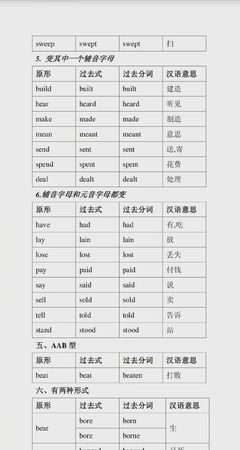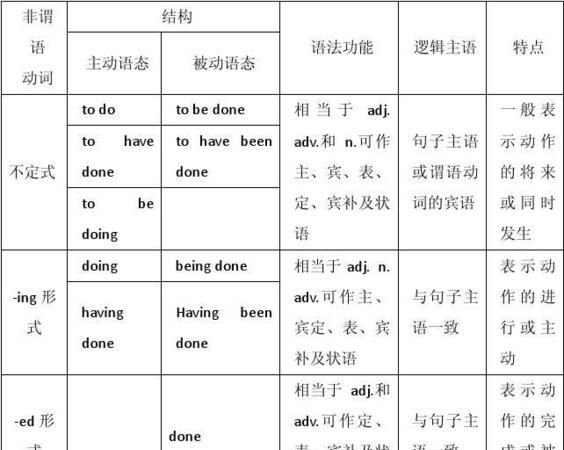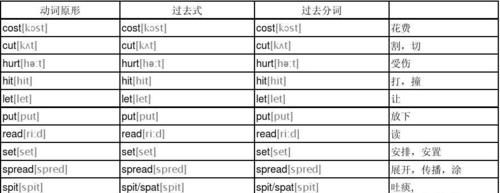本文目录
初中英语动词后接动名词有哪些
ving作宾语
①admit,avoid,consider,dislike,enjoy,escape,excuse,feel like,finish,forgive,give up,imagine,include,keep,mention,mind,miss,practise,put off,resist,risk,suggest,can’t help,can’t stand等动词后须用Ving形式作宾语,但不能用不定式.
②forget,go on,like,mean,regret,remember,stop,try等动词可带Ving形式或不定式作宾语,但意义上有区别.试比较:
I remember doing the exercise.我记得做过练习.I must remember to do it.我必须记着做这事.
I tried not to go there.我设法不去那里. I tried doing it again.我试着又干了一次.
Stop speaking.不要讲话.He stopped to talk.他停下来讲话.
I mean to come early today.我打算今天来早些.
Missing the train means waiting for another hour.误了这趟火车意味着再等一个小时.
③在allow,advise,forbid,permit 等动词后直接跟动词作宾语时,要用Ving形式,如果后面有名词或代词作宾语,然后在跟动词作宾语补足语时,其宾语补足语用带to的不定式.We don’t allow smoking here./We don’t allow students to smoke.
④动词need,require,want作“需要”解,其后跟动词作它的宾语时,必须用Ving形式,或不定式的被动式,这时,Ving形式的主动形式表示被动意义.例如:
The window needs (requires,wants) cleaning (to be cleaned).
.

英语中哪些词只能带动名词形式
也可以说是哪些动词后只接动名词作宾语
avoid ,admit ,advise ,consider ,delay ,enjoy ,finish ,forbid ,give up ,imagine ,keep ,mind ,miss ,practise ,permit ,resist ,risk ,suggest ,stop 等
记住上面那些就很多了!他们展开了即很多了!还有些别的你到后来见得多了自然而然就能知道了.别着急.

初中英语后跟动词不定式的动词和短语
后接动名词的固定搭配
aim at目的在于,旨在;瞄准
accuse...of...控告;谴责
depend on取决于
devote to奉献,致力
engage in从事于,忙着;订婚
feel like欲,想要
go on继续;发生
cannot/couldn�t help禁不住;不得不
insist on坚持
keep from使……不(做)
keep on继续不断,保持
look forward to盼望,期待
persist in坚持,持续
prevent from预防,防止
put off推迟,推延
set about开始,着手
succeed in成功
thank for感谢
think of想起,想到;想一想
1.只能跟to do作宾语 的动词
afford,agree,arrange,choose,claim,demand,deserve,decide,expect,fail,hurry,hope,manage,offer,plan,prepare,promise,pretend,refuse,wish,threaten,
2.只能跟doing作宾语 的动词
acknowledge,admit,advocate,appreciate,avoid,consider,contemplate,complete,consider,delay,deny,
dislike,enjoy,escape,excuse,evade,fancy,finish,imagine,involve,mind,miss,practise,prevent,risk,resist,resent,repent,suggest,
can't help情不自禁, burst out突然爆发,give up放弃, get through完成, put off推迟,
keep on doing 持续 can't stand doing
3.常见的动词+介词to后跟doing 做宾语
be used to doing习惯于,add to doing加上,devote to doing献身于,lead to doing导致于,
get to doing开始,come to doing谈到,look forward to doing期待,stick to doing坚持
be sentenced to doing宣判,object to doing抗议,
4.常见的动词+形容词+介词of后跟doing做宾语
be fond of doing, be afraid of doing, be tired of doing,
5.动词+其他介词后跟doing 做宾语
insist on doing, prevent from doing,spend in (on)doing, be interested in doing
6.有些动词后面可以跟to do作宾语,也可以跟doing 作宾语,
A、含义不同
remember to do记住去做 remenber doing记得做过
regret to do遗憾的做 regret doing懊悔作了
forget to do忘记去做 forget doing忘记做过
try to do努力去做 try doing试试去做
help to do帮助做 can't help doing禁不住
need to do主动需要 need doing需要被做
want to do主观想要 want doing需要被做
stop to do停下去做(目的状语) stop doing停止做
go on to do接着做 go on doing继续做
B、差别细微 doing表抽象一般, to do表具体就要发生
like doing like to do
love doing love to do
hate doing hate to do
prefer doing prefer to do
C、无差别
start,begin.continue,intend,cease.
1. -ing 分词修饰人或类人时,用来表示人正在发生的动作,不需重读,
解释为someone who is doing
2. -ing 分词修饰物或类物时,用来表示此物的用途或特征,需要重读,
解释为something which is used to do

初中英语只能接动名词的动词
I.在enjoy, appreciate, admit, consider, mind, avoid., miss, can’t help, deny, practise, allow, finish, imagine, forbid, suggest等这些动词之后要求用动名词作宾语。
例如:
1.Have you finished repairing your car?
2.She suggested spending another week in the country.
3.Do you feel like taking a walk.
II.以不定式做宾语的动词很多, 常见的有:want, hope,wonder, wish, agree, try, manager, offer, decide, fail,refuse, ask, pretend, intend, attempt, teach, discuss 等。例如:
1.I have learned to drive the car.
2.They refused to accept my suggestion.
3.He promised to come.
III.有些动词既可用动词不定式也可用动名词作宾语。
一.这两种情况在意义上差别不大的词有:love, like, hate, prefer, begin, start, continue, need, intend, attempt等。 例如:
Do you like playing(to play) chess?
When did you begin learning(to learn) French?
注意:在like, love, prefer等动词后, 若表示经常性的抽象的动作,多用动名词作宾语;若指特定的或具体的行动, 则用不定式更多一些。例如:
I like swimming, but I don’t like to swimming today.
She prefers walking to cycling.
I prefer to stay at home today.
注意:在begin, start等词的后面, 在下面三种情况下, 后接动词不定式较好:
�8�5主语是物而不是人时:Ice begins to melt.
�8�5本身是v-ing 形式时: We are starting to clean the classroom.
�8�5其后的动词与想法,感情有关时:I begin to realize that he is wrong.
二.在两种结构在意义上差别较明显的动词有: remember, forget, regret, stop, mean, try等。例如:
1.remember后接动名词通常表示:记得干过某事的,跟动词不定式通常表示:别忘了, 要记得干, 动作并未发生:
I remembered posting the letter today.
我记得今天把信寄走了。
�8�5 Please remember to post the letter today.
请别忘了今天把信寄走。
2.regret 后接动名词, 通常表示:对已发生的情况表示后悔,跟不定式通常表示:对将来的情况表示抱歉
�8�5 I regret to inform you that you won’t be able to attend the class.
我们遗憾地通知你们, 你们将不能参加这个班。
�8�5 I regretted having done such a thing.
我后悔做了这样一件事。
3.mean后接动名词, 通常表示:意味着, 不定式通常表示:打算干什么。
�8�5Failing this exam means waiting for a year.
这次考式不通过意味着要等上一年。
�8�5I didn’t mean to argue with you.
我不想和你争辩。
4.try 后接动名词, 通常表示:式一式做某事,跟不定式通常表示:设法去做某事:
Let’s trying doing the work in this way.
这项工作咱们这样式式看。
�8�5I’ will work hard, and try to improve.
我将努力工作, 并设法改进。

以上就是关于初中英语只能接动名词的动词 ,初中英语动词后接动名词有哪些的全部内容,以及初中英语只能接动名词的动词 的相关内容,希望能够帮到您。

